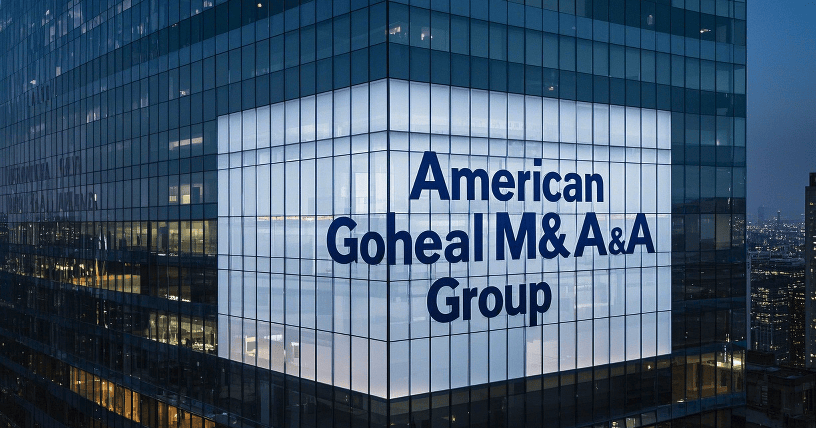"Nothing is impossible, nothing is impossible" - this once popular corporate slogan seems to have become a true portrayal of some capital players' unexpected success in the capital market. Today, the capital market is surging, and the acquisition of controlling rights of listed companies is no longer simply a beautiful picture of "resource integration" or "technical complementarity", but is full of countless undercurrents of game and strategic manipulation. As Goheal has deeply realized in the process of multiple capital operations - when the "ceiling" of industry access meets the "flexible means" of capital operation, the acquisition of controlling rights is no longer just a simple transaction, but a capital game full of variables and unpredictability.
 American Goheal M&A Group
American Goheal M&A Group
If traditional mergers and acquisitions are still "gentle" resource sharing and collaborative integration, then in today's capital market, many acquisition behaviors have become extremely "wild". They often use capital means to directly break through the restrictions on industry access, bypass layers of regulatory barriers, and ultimately achieve complete control of the target company. This "wild" approach of capital not only breaks the industry rules, but also profoundly affects the entire industry ecology.
aspcms.cnFrom "rules" to "curves to save the country"
"If you want to see a thousand miles away, you must climb to a higher level." - This poem outlines a strong enterprising spirit, suggesting that people always try to break through the limitations in front of them and move to a higher level. In the world of mergers and acquisitions, this "enterprising spirit" often turns into crazy actions of capital. Take the acquisition of controlling rights as an example. When the acquirer faces restrictions and barriers to industry access, it often no longer relies on directly breaking through industry regulations, but takes some "curves to save the country" methods to quickly achieve the acquisition goal of controlling rights.
In the past, industry access has always been regarded as an important means of market supervision, especially in sensitive industries such as energy, finance and the Internet, where industry access often has relatively strict requirements. If companies want to enter these industries, they must go through strict approval procedures and make guarantees in terms of compliance, market competitiveness, etc. However, the rapid development of the capital market has given capital parties unprecedented operating space, allowing some companies to circumvent industry access barriers through capitalization.
For example, some technology companies quickly achieved controlling stakes in sensitive industry companies by acquiring affiliated companies or adopting equity penetration. This operation method takes advantage of the flexibility of the capital market, allowing the acquirer to avoid the "ceiling" of industry access, complete the acquisition through the capital market without directly violating regulatory policies, and quickly occupy the leading position in the industry.
This kind of "curve-saving" approach undoubtedly allows capital parties to obtain more opportunities and advantages, and also breaks the inherent rules of industry access. The core of this method is to use the power of capital to complete the control of the target enterprise at a lower cost, quickly achieve market integration, and form a strong impact on the industry.
Behind the "leap" of capital
The "leap" of capital is not achieved overnight, and it is often behind a well-thought-out strategic layout and precise resource allocation. Goheal knows that the acquisition of controlling rights is not just a simple capital investment, but also an extremely complex strategic game. In this process, the leap of capital is often achieved through the following methods.
1. Clever design of equity structure
Through mergers and acquisitions and adjustments to the equity structure, capital parties can quickly obtain actual control by acquiring part of the equity of the target enterprise. Although this method avoids direct conflicts in industry access, it can still play a huge role in the capital market. Through the clever design of the equity structure, the capital party can not only obtain control over the target company, but also take the initiative in its future development.
For example, a financial technology company quickly achieved control over the company by purchasing a large number of shares in the target company and reaching an equity entrustment agreement with its core management without obtaining direct industry access permission. In this way, the capital party bypassed the strict regulations on industry access and obtained substantial control.
2. Acquisition financing and leverage operation
The capital party can maximize the efficiency of its own capital while controlling the target company through financing leverage. This "leveraged" acquisition method can not only quickly complete the acquisition of controlling rights, but also quickly amplify the influence of capital in the capital market. This method often uses debt financing, shareholder loans and other means to enable the capital party to obtain greater control at a lower cost of funds.
Taking the M&A case of an energy company as an example, the acquirer successfully obtained the controlling rights of the target company with a lower amount of its own funds through leveraged acquisition. Through shareholder loans and financing tools, the acquirer can not only reduce the pressure of acquisition funds, but also successfully transfer the controlling rights without violating industry access regulations.
3. Strategic cooperation and mergers and acquisitions within the industry
In addition to direct acquisitions and financing operations, capital parties often gradually improve their market share and competitiveness through strategic cooperation and mergers and acquisitions within the industry. In this process, capital parties break through industry access restrictions through the establishment of strategic alliances and the form of cooperation, thereby achieving complete control over target companies.
This method is particularly suitable for sensitive industries that are subject to industry access requirements. For example, a multinational technology company obtained access to the local market through strategic cooperation with local companies. In this process, capital parties gradually obtained controlling rights of local companies through cooperation and achieved control over the market.
The "tripping horse" of access policy: Is it a constraint or a guarantee?
So, when industry access policy becomes a "tripping horse" on the road of capital acquisition, how should we view this phenomenon? For many companies, industry access restrictions are undoubtedly an important factor hindering their development, but for capital parties, it is these access policies that have become the biggest obstacle to their capital leap. In other words, although the access policy protects fair competition in the market from a certain perspective, it has also become a major "tripping horse" for capital operations, restricting the free flow of capital.
As investors and entrepreneurs, how to find a balance between industry access policies and capital operations is a key issue that every decision maker needs to think about. Faced with stringent industry access requirements, should capital parties break through industry barriers by "curve-saving"? Or should they respect industry rules and avoid excessive capital operations in a compliant manner?
Conclusion: Conflict between industry access rules and capital
In the game of the capital market, the conflict between industry access policies and capital operations is obviously a core issue that will continue to exist for some time in the future. As investors and entrepreneurs, should we learn lessons from this game and think about how to achieve true compliance and sustainable development in capital operations?
 Goheal Group
Goheal Group
Welcome to leave a message to discuss. In your opinion, how should industry access policies balance the free flow of capital and fair competition in the market during capital acquisitions?
[About Goheal] Goheal is a leading investment holding company focusing on global mergers and acquisitions. It has deep roots in the three core business areas of acquisition of controlling rights of listed companies, mergers and acquisitions of listed companies, and capital operations of listed companies. With its profound professional strength and rich experience, it provides companies with full life cycle services from mergers and acquisitions to restructuring and capital operations, aiming to maximize corporate value and achieve long-term benefit growth.
